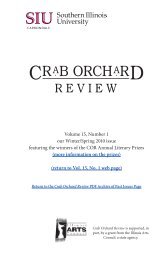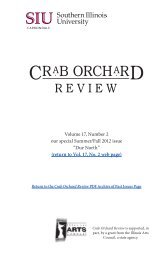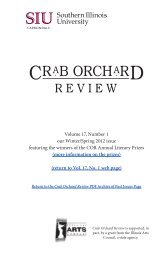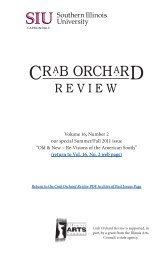Crab Orchard Review Vol. 12, No. 2, our
Crab Orchard Review Vol. 12, No. 2, our
Crab Orchard Review Vol. 12, No. 2, our
You also want an ePaper? Increase the reach of your titles
YUMPU automatically turns print PDFs into web optimized ePapers that Google loves.
Book <strong>Review</strong>s<br />
Yet he carries them with him<br />
With a certain affection. Some nights,<br />
Dark and drunk, he smiles to think of his grandfathers<br />
Arm wrestling within him. The farmer wins, of c<strong>our</strong>se,<br />
But the banker has foreclosure capped<br />
Inside his fountain pen.<br />
For the poem’s speaker, becoming like these men is an inevitability.<br />
“What’s good about getting older?” he asks, “You turn into men you<br />
thought you’d never know / While the world yammers on around<br />
you / Hilarious and hysterical.” It’s a tough burden to carry, one that<br />
imbues Graham’s poems with their significant and turbulent heft.<br />
Yet there is another side to A World Without End, a tender and elegiac<br />
one. In the book’s second section, shorter lyrics provide testimony to<br />
the delicate balance of a long-term relationship, demonstrating through<br />
a curt and clipped diction how a couple can survive “the steaming<br />
salvage yard of marriage.” There are no easy answers to this dilemma,<br />
only small consolations, like in the poem “Anniversary”:<br />
There are more stars than we remember and I rename<br />
The constellations: Cadillac de Ville, Hoover Upright, Man<br />
Reluctantly Losing All He Loves. She sighs<br />
And leans into the rail, stars in her hair and I spill<br />
Styrofoamed coffee all over my hands.<br />
Just hold me, she says,<br />
And I do.<br />
The speaker’s romantic tendernesses are countered here by a weary<br />
yet poetic cynicism—renaming stars after cars and appliances, then<br />
admitting, albeit reluctantly, what he feels slipping away. These poems<br />
are painful, but they ring true in their abrupt sparseness.<br />
Poems in the book’s third and f<strong>our</strong>th sections take us further<br />
afield from the poet’s personal history into a greater brand of American<br />
history: unexplored small-town Indiana, Gettysburg, the after-effects<br />
of Vietnam, Americans abroad in Ireland and Italy, and the dolor of<br />
the classroom, where students in the poem “Offices,” unreachable and<br />
unteachable, shrug off Robert Hayden’s “Those Winter Sundays”:<br />
One kid suggests that maybe Robert<br />
Didn’t like his father very much<br />
<strong>Crab</strong> <strong>Orchard</strong> <strong>Review</strong> ◆ 223






